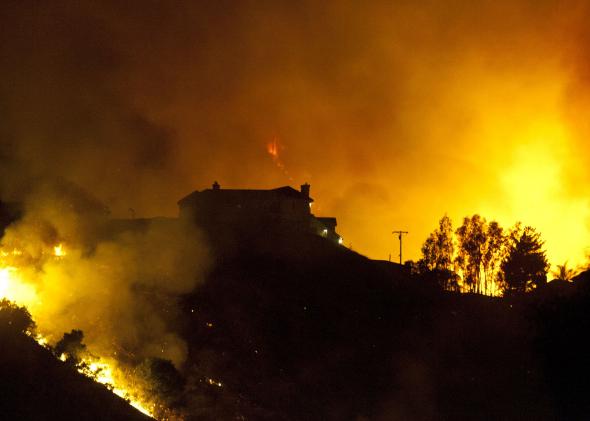Burn, Baby, Burn—if We Say So
http://www.slate.com/articles/technology/future_tense/2014/07/box_and_burn_the_future_of_u_s_wildfire_policy.html?wpisrc=hpsponsoredd2

A wildfire threatens homes in San Marcos, California, on May 15, 2014. The blazes come amid record temperatures in the state, where the annual wildfire season typically starts much later in the year.
The last time California had a drought this severe, 1977, I was the foreman of the North Rim Longshots, a seasonal fire crew stationed at Grand Canyon National Park. By mid-June every national forest in Arizona had a major burn. Then California began one of its epic seasons, becoming a black hole that drafted in crews and aircraft from across the country in a running firefight that didn’t end until the winter solstice.
What was then exceptional has now become a new norm. The largest category of fire at the time was Class G (more than 5,000 acres). Now the big ones—megafires—come one or two orders of magnitude larger. For the last decade, we’ve had one or two a year on average.
The standard narrative for how this happened revolves around a misguided policy that, after the Great Fires of 1910, sought to remove fire of every kind with equal vigor. It didn’t matter if the fire started from lightning or from traditional human practices, of which there were many because fire was widely used to assist foraging, hunting, farming, herding, prospecting, and land use generally, though a fraction of such burning was careless and abusive. Nor did it matter if it was a good fire that enhanced the land or a bad one that degraded biota or burned through human settlements—they were all to be fought. The mere attempt to do so unhinged most ecosystems and primed many for more explosive burning. By the 1980s that legacy merged with a climate tipped toward drought and a rural landscape that once buffered but was now disappearing into wilds or exurbs.
A fuller narrative breaks that story in two. For 50 years official policy sought to stop people from using fire in traditional ways, for good or ill—and to suppress any fires that did occur from any source. This project in “fire exclusion” was overseen by the U.S. Forest Service, which became a benign hegemon. It was a strategy that stopped bad fires that might burn into commercial timber or communities. But because it also eliminated the effects of good fire, it ended up triggering the equivalent of an ecological earthquake.
